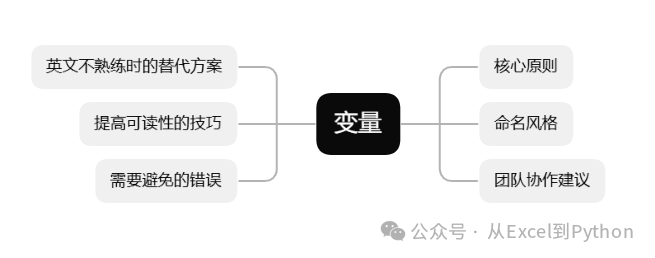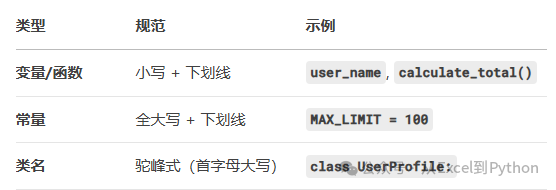
In Python, good variable naming conventions can significantly enhance code readability, maintainability, and team collaboration efficiency. Here are strongly recommended and widely recognized variable naming conventions, along with practical suggestions based on English proficiency:
1. Core Principles
- Letters + Numbers + Underscores: Variable names can only contain a-z, A-Z, 0-9, and _, and cannot start with a number.
✅ price_2
❌ 2nd_price
-
Case Sensitivity: name and Name are different variables.
-
Avoid Keywords: Do not use Python reserved words like class, def, if, etc.
❌ list = [1, 2] → Use items = [1, 2] instead
2. Naming Styles
- Variables/Functions
Lowercase + Underscore
user_name, calculate_total()
- Constants
All Uppercase + Underscore
MAX_LIMIT = 150
- Class Names
Camel Case (First letter capitalized)
class UserProfile:
Summary as follows:

3. Alternatives When English is Not Proficient
3.1 Pinyin Naming (requires team consensus)
- Full Pinyin + Comment Explanation:
yonghu_mima = "123456" # 用户密码(user_password)
- Pinyin Initials Abbreviation (use with caution, can be ambiguous):
xs_list = [...] # 销售数据 (xiaoshoushuju)
3.2 Mixing Pinyin with Simple English
- Pinyin (Noun) + English (Verb/Unit):
shangpin_price = 100 # 商品价格
xuesheng_count = 50 # 学生数量
3.3 Using Translation Tools for Assistance
- Use translation tools to look up basic vocabulary:
“库存” → inventory (not kucun)
“订单” → order (not dingdan)
4. Tips for Improving Readability
- Avoid single-letter variables (unless they are loop variables):
❌ a = 10 → ✅ item_count = 10
- Use is_/has_ prefix for boolean variables:
is_active = True # rather than active = True
- Use plural to indicate collections:
users = ["zhangsan", "lisi"] # rather than user_list
- )
5. Mistakes to Avoid

6. Team Collaboration Suggestions
- Establish a naming dictionary: Share a bilingual glossary within the team, for example:
User → user, Order → order, Price → price
- Code Review: Check each other’s variable names for clarity, especially for Pinyin naming.
7. Example Comparisons

Conclusion
-
Prioritize using English (even simple words like count, total).
-
When using Pinyin naming, add comments and ensure team understanding is consistent.
-
Tool Assistance: Use IDEs (like PyCharm) for spell checking and translation plugins (like Google Translate).
By following these methods, even with limited English proficiency, you can write more readable Python code. The key is to maintain consistency and ensure that other team members can understand your naming logic.
Standardized variable names are crucial for the “self-documenting” nature of code. Initially, it may take time and effort, but over time, it can significantly reduce maintenance costs!